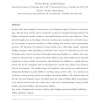Free Online Productivity Tools
i2Speak
i2Symbol
i2OCR
iTex2Img
iWeb2Print
iWeb2Shot
i2Type
iPdf2Split
iPdf2Merge
i2Bopomofo
i2Arabic
i2Style
i2Image
i2PDF
iLatex2Rtf
Sci2ools
COR
2010
2010
Strong activity rules for iterative combinatorial auctions
Activity rules have emerged in recent years as an important aspect of practical auction design. The role of an activity rule in an iterative auction is to suppress strategic behavior by bidders and promote simple, continual, meaningful bidding and thus, price discovery. These rules find application in the design of iterative combinatorial auctions for real world scenarios, for example in spectrum auctions, in airline landing slot auctions, and in procurement auctions. We introduce the notion of strong activity rules, which allow simple, consistent bidding strategies while precluding all behaviors that cannot be rationalized in this way. We design such a rule for auctions with budget-constrained bidders, i.e., bidders with valuations for resources that are greater than their ability to pay. Such bidders are of practical importance in many market environments, and hindered from bidding in a simple and consistent way by the commonly used revealed-preference activity rule, which is too st...
Related Content
| Added | 09 Dec 2010 |
| Updated | 09 Dec 2010 |
| Type | Journal |
| Year | 2010 |
| Where | COR |
| Authors | Pavithra Harsha, Cynthia Barnhart, David C. Parkes, Haoqi Zhang |
Comments (0)

